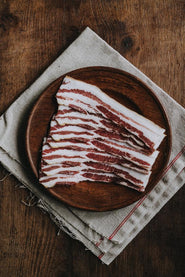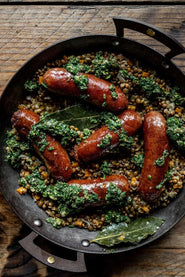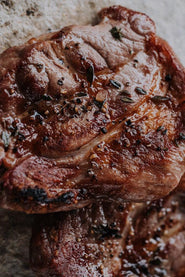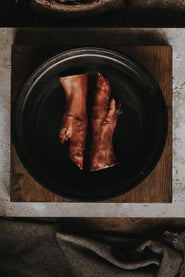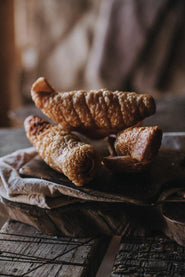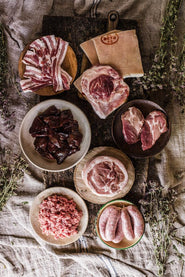As you may have seen from our appearance on BBC’s Countryfile, we are passionate about the welfare of our native breed pigs. Our pigs live a long contented life, foraging, wallowing and with acres of space to roam. This could not be further from how an industrially reared pig - the unlucky poster child of factory farming – is forced to live its life.
While we don’t anthropomorphise our livestock, that doesn't mean that we don’t believe they are sentient beings who deserve to live a fulfilled, contented life.
Pigs in particular, are remarkably intelligent, and unlike the lazy, greedy caricature that is typically portrayed, they are active, curious creatures. This makes the normalisation of industrial farming systems and the depravity that comes with them all the more extraordinary.
The Pig
As with industrial chicken, factory-farmed pigs have been bred to the extreme, to produce a fast growing animal optimised for meat production, not animal wellbeing. These are creatures with a big appetite, selected to produce as many piglets as possible, as fast as possible, sometimes over 20 per litter.
Industrial pigs are typically slaughtered at around five to six months old, while ours are allowed to mature at a natural rate, going to slaughter at nine months.
Pigs do not have sweat glands so cannot cool themselves without access to wallows, and those in factory farms are especially vulnerable to disease, which can be rampant in such high intensity systems. Cue the antibiotics, which are used so much in industrial farming globally that we are reducing their effectiveness on pathogens that infect humans – all in the name of 'cheap' meat.
Meanwhile our pigs are all native breeds, robust pigs that thrive in our extensive free range system and produce equally tasty pork as it does bacon. Each breeding sow produces 8-11 piglets per litter, and only produce up to two litters a year. With their strong maternal instincts – something that is often lost in highly bred animals – the offspring are very well cared for and healthy with very little intervention from us.

The Life
Our pigs spend their entire lives family farms thriving in the sun, rain and mud, living and farrowing outdoors all year round - for their entire lives.
Pigs are highly social creatures with individual personalities, and spend much of their time naturally interacting with one another, yet industrial systems enforce separation. Not only this, they have incredibly powerful instincts which drive them to exhibit all kinds of behaviours – wallowing in mud to cool down, foraging for food, but perhaps the most beautiful to watch is a pregnant sow’s nesting activities. We of course fill each pig ark with bright, clean straw, yet the sows will still seek out extra materials to line their nests, such as dried grass – it’s such a strong desire to prepare for the arrival of their litters.
In contrast an industrial pig is often kept on bare concrete – and that’s it. In some industrial farms they are in multiple layers, one layer on top of the next, to really maximise livestock fattening per metre squared. They cannot even turn around, and once piglets are born they are kept in farrowing crates designed to prevent the mothers crushing their offspring to death in the small space they are forced to live in.
Our piglets run outdoors with their mothers in family groups until they are naturally weaned, before moving onto larger paddocks, still in their family groups, at around two months old. We castrate our male piglets, as otherwise there would be fighting between young boars, and it also allows us to grow them on long and slow without risking aggression in the herd due to excess testosterone. It takes a couple of seconds to castrate a piglet and the best way to describe it, is like getting your ears pierced, a quick sharp pain followed by an ache that is quickly forgotten. This incredibly short term pain means we can give our pigs a longer, fuller life. It also removes the risk of biting by other pigs who, if kept fully intact would form a 'pecking order'. Because of this and the wonderfully healthy, stress free environment our pigs enjoy, we have no need for teeth clipping or tail docking – all practices that are routine in intensive farming systems that have to be in place to stop the cannibalism that these intensive systems create.

The Food
Domestic pigs originate from wild boar, a woodland and riverside dwelling animal with an omnivorous diet. Their natural drive is to rootle and snuffle through soil and undergrowth to turn up grubs, leaves, nuts, roots, insects and feast on flowers. It’s when they seem truly happy to us, gently grunting with what seems like pleasure as they seek tasty morsels.
At Pipers Farm all of our pigs are reared on as natural a diet as is practical to achieve. They spend eight weeks on their mother’s milk, benefiting from the natural immunity it provides for far longer than is standard practice. Once weaned they are rotated across our farms, through pastures and leys where they graze and root through the grasses and herbs, around wooded areas where they seek out acorns and hazelnuts, through cider orchards where they feast on windfall apples, then on to fodder crops in the winter such as beet, kale and turnips. Here they root up and eat the crops straight from the earth, and it never ceases to amaze us how efficient they are at clearing a field – there is no food wasted here! They are also given a straightforward cereal mix at certain points to make sure they get the nutrition they need.
An industrial pig however does not get anything near such a diet. Instead it is a high-energy, ultra-processed feed that is engineered for fast growth and that’s it. Soy and corn feature heavily, alongside additional minerals and vitamins, all pressed into grey pellets delivered to each animal in a rationed portion.

The End
Industrial pig slaughtering is all about speed and volume, where the success marker is how many pigs are put through per hour. In contrast, the respect with which we treat our pigs runs all the way through to slaughter. We work closely with low throughput abattoirs. Herds are not mixed with those they don’t know, which can prompt fighting and high stress levels. After slaughter we hang our pork for three weeks and are perhaps one of the last places in the UK to do so. We do this as it produces an exceptional flavour and superior quality of meat that does not shrink disproportionally when cooked.
As farming becomes more intense, we become all the more committed to our exceptionally high standards of farming, that put animal welfare and sustainability front and centre.

